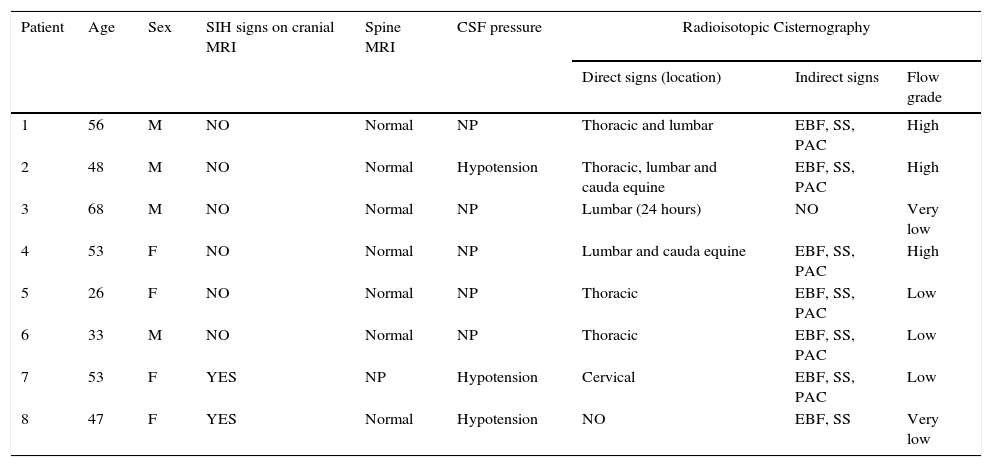Spontaneous intracranial hypotension is a clinical syndrome caused by a loss of cerebrospinal fluid volume, usually secondary to leaking through structural defects of the spinal dura mater. Radioisotope cisternography (RC) can confirm the diagnosis of spontaneous intracranial hypotension, especially in doubtful or atypical case presentations. A retrospective study was conducted on 8 patients who underwent RC because spontaneous intracranial hypotension was suspected, and they presented with atypical clinical manifestations and/or inconclusive findings in other imaging techniques. RC detected paradural extravasation of cerebrospinal fluid in 7 patients. Moreover, there was indirect evidence of cerebrospinal fluid leaks in all 8 patients (early appearance of radioactivity in the bladder, soft tissue uptake of radioisotope and/or reduction in the amount of radiotracer in the brain at 24h). RC had a significant impact on the diagnosis of 6 patients, and on the therapeutic management of 4 patients.
La hipotensión intracraneal espontánea es un síndrome clínico debido a la pérdida de volumen de líquido cefalorraquídeo, generalmente secundario a su fuga por defectos estructurales de la duramadre espinal. La cisternografía radioisotópica (CR) es una técnica que puede aportar un diagnóstico confirmatorio en este síndrome, principalmente en casos dudosos o de presentación atípica. Estudiamos retrospectivamente 8 pacientes con CR realizada por sospecha de hipotensión intracraneal espontánea con clínica atípica y/o hallazgos no concluyentes en las técnicas de imagen. La CR detectó extravasación paraespinal de líquido cefalorraquídeo en 7 de ellos. Además, se apreciaron signos indirectos de fuga de líquido cefalorraquídeo en los 8 pacientes, consistentes en la presencia precoz del radiotrazador en orina, presencia de actividad de fondo corporal y/o reducción de la cantidad de radiotrazador en cráneo a las 24h. La CR tuvo un impacto significativo en el diagnóstico de 6 pacientes y en el manejo terapéutico de 4 pacientes.
Article
If you experience access problems, you can contact the SEMNIM Technical Secretariat by email at secretaria.tecnica@semnim.es or by phone at +34 619 594 780.

Revista Española de Medicina Nuclear e Imagen Molecular (English Edition)










